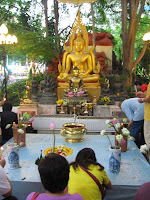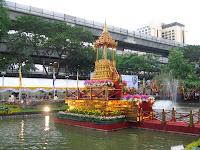 After much anxiety and a bit of stage fright, I finally made it into the classroom yesterday. Here are my students hard at work on a quiz I gave them to assess their current level of English. Although I explained that the test would not be graded, that I was only giving it to help me determine how to teach them English, they were surprisingly serious about it. Long after I asked them to hand their papers in, some continued to write. There was some talking, and I suspect a few copied their neighbor's answers. From the results, I learned that many had problems with plurals and prepositions and a large number wrote "five-teen" for 15. They were quite good, but slow, in ordering a list of words in alphabetical order.
After much anxiety and a bit of stage fright, I finally made it into the classroom yesterday. Here are my students hard at work on a quiz I gave them to assess their current level of English. Although I explained that the test would not be graded, that I was only giving it to help me determine how to teach them English, they were surprisingly serious about it. Long after I asked them to hand their papers in, some continued to write. There was some talking, and I suspect a few copied their neighbor's answers. From the results, I learned that many had problems with plurals and prepositions and a large number wrote "five-teen" for 15. They were quite good, but slow, in ordering a list of words in alphabetical order.I have been hired to teach "Listening & Speaking English III" in the Department of Foreign Languages (Faculty of Humanities) at the Wat Sri Sudaram campus of Mahachulalongkornrajavidyalaya University, the major Buddhist educational institution in Thailand. My students are all monks in their twenties, most ordained and some still novices, from all over Thailand as well as Laos, Cambodia and Burma. All are fourth year students majoring in English and many will probably disrobe after graduation this year to find jobs in the secular world. My task is to help them communicate with English in this increasingly globalized world where my native tongue is the lingua franca.
Only about half of my 51 students showed up. "It's a tradition not to come during the first week," explained Dr. Suriya, a senior monk who heads my department. I am scheduled to teach two sections between 1 and 6:30 p.m. on Thursdays. Since another professor didn't show up for his class during the first period, students from both my sections crowded into the classroom. The afternoon classes (there are no morning classes, since the day begins after lunch) began after a short Buddhist chant over the PA system. Leaving the two doors open, I also opened the windows and turned on the two fans, but it remained warm in the room. I rolled up the sleeves on my blue dress shirt but did not undo the classy red tie that Jerry had loaned me. Thais expect their professors to look formal. The school term is 16 weeks but the start was delayed a week. Some of the students told me that they hadn't been informed of this fact, and showed up for class last week (obviously they were also unaware of the tradition).
It took me nearly two hours, by Skytrain, riverboat and taxi, to reach the school on the other side of the Chao Phraya River. I carried a heavy backpack crammed with books and materials to use. Arriving an hour early, there was no one in my department to explain the procedures. So, after a snack in the small cafeteria, I went to the office on the second floor that Pandit Bhikku had pointed out as administration (all the signs were in Thai). The monk behind the desk greeted me with "Dr. William!" and showed me where to sign in. He handed me two student rosters for my sections with all of the information in Thai. Obviously this wasn't going to be easy. He said the room numbers for the two sections had been changed from the earlier ones given me, and showed me where they were. Good thing, too, since the room numbers were also in Thai.
Before class started, I visited the library on the ground floor. There were numerous periodicals available, including the Bangkok English language press as well as Time, Newsweek and the Wall Street Journal. A number of monks were seated at an array of computer terminals. I saw a a group of shelves at the back of the room and learned later that the library contained a few of English language titles. There is a listening lab on the top floor of the school, a student told me, but it is never open. I'll have to see about that.
When the students started slowly coming into the classroom, I recognized several from the talk I had given to the English Club several months ago. I learned that the monks lived at different temples all over Bangkok and some had to travel a fair distance to get to school. My introduction had several false starts to accommodate late arrivals. I told them we were all students since I'm learning to teaching English, something I've never done before. Someone hooked up a microphone, which I didn't think I would need, but it gave me the opportunity to strut in front of the class playing the rock star. Next week I think I'll put the chairs in a circle for less formality, and less strutting.
I soon realized I'd over prepared and could never cover the grammatical material in the first unit of the New Headway Elementary text (the students will purchase a duplicated version from the school copy center for under $3). There were two breaks scheduled in the first section, at 1:50 and 2:40, but no one wanted to leave. So I continued to talk, about English language resources in Bangkok (watch movies in English, and listen to songs in English), grades (students are rarely failed in Thailand) and rules (no sleeping in class). My introduction took up the first period, the quiz the second (after which we sang in unison "The Alphabet Song"), and in the third I asked them to break up into pairs and interview each other. They each introduced their partner, giving his name, age, where he comes from, and his mobile phone number to test their pronunciation of numbers (which was surprisingly good). This activity energized them and some of the introductions were creative and funny ("call my friend at any time for money").
At the end of the section time I asked them to write something about themselves for homework and gave them a vocabulary list to memorize and use in five sentences. On the other side of the sheet were the words to "What a Wonderful World." I played them the song by Louis Armstrong on my iPod and asked them to fill in the blanks from a word list. They liked it so much they asked me to play it again. I asked them to give me the names of other English songs they would like to hear and learn.
During the session a number of students let me know that they were in my other section. This threw me into a bit of panic because I'd prepared for two similar sections, not one long five-and-a-half hour class. I went next door into the other classroom I'd been assigned to set up for the second section, but soon learned that I had in fact taught a combined class of two sections (what added to the confusion was that there were 25 students in the classroom, the number enrolled in the first section). So I learned abruptly I was finished for the day, a bit disappointed that I didn't get to hone my skills a second time through.
Downstairs, I looked for Dr. Suriya to get the two documents I needed to complete my application to convert my visa from tourist to non-immigrant "B" which will allow me to teach legally. I gave him the list of requirements two weeks ago after I was turned down by immigration at my first attempt. After a wait of 45 minutes, I discovered that the letter (no word about the requested employment contract) had still not been signed by the dean of Humanities. Pandit Bhikku, my mentor for all this, sent me a "if you can't stand the heat, get out of the kitchen" email two weeks ago. So I've decided to stop complaining about the bureaucratic snafus and accept what comes. I asked Dr. Suriya to protect me if I get arrested for teaching illegally, and his laughter hid a multitude of responses.
Afterwards, I met Pim at the Central Pinklao Mall not far away, and, following dinner and a quick game at Major Bowl across the street, we went to look at an apartment for rent in the multi-storied Lumpini Place. Although about as small as our current one, it's divided into a living room and bedroom, and includes a tiny kitchen. The condo is owned by a British-Thai couple and rents for the same price as my current apartment. The furnishings include a comfy couch and a nice reading chair which tipped the scales in its favor. If all goes according to plan, we should move at the end of June.







































